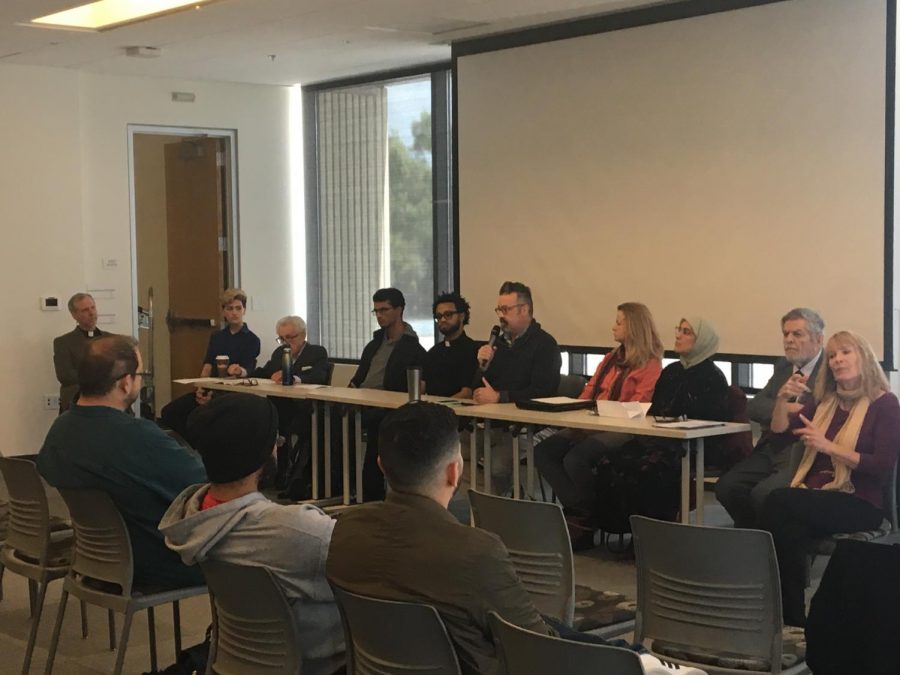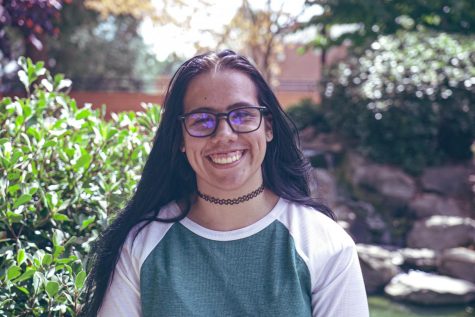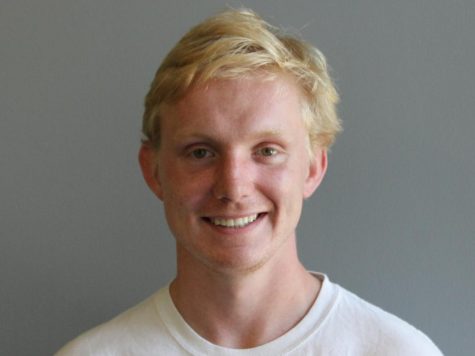Community members come together in response to Christchurch attacks
Reverend Will McGarvey speaks in front of students, panelists and faculty in the Diablo Room on March 20, 2019. (Gavin Rock/ Inquirer)
March 25, 2019
Devastation loomed across the faces of several panelists from a diverse array of religious backgrounds on the Stand Against Hatred and Gun Violence held on Wednesday, March 20. In the face of adversity, the panelists advised the community at Diablo Valley College to unite together in response to the attack at Christchurch in New Zealand that transpired on March 15.
The event was hosted by professor Amer Araim, a political science professor who has many connections among people of faith in the Bay Area. Araim began discussion by emphasizing the need for communication between panelists, school administration and student body, something which only seems to happen in the wake of tragedy.
“We would see to this meeting as an open dialog between us, the faculty, and the guests on one side and the students of DVC on the other side to elaborate on ways and means to ensure the protection of freedom of speech, religion press, as well as our rights to petition as a government,” said Araim.
Ameena Jandali, one of the panelists, is also a founder of the non-profit Islamic Networks Group, ING. According to their website, ING a national group dedicated to standing against hate and bigotry through education and interfaith engagement. Given Jandali’s background, it’s understandable why she expressed frustration when her time to talk came.
In a statement directed towards both the panelists and students, Jandali said “How many times are we going gather here to mourn for the victims and pray for the families? How many lives are going to be lost to this scourge of hate and loss? It should now be clear that hate has no religion, no race, no ethnicity and when all human beings are killed they all bleed red blood. It’s sad that death often brings us together in a way that life doesn’t, but at least we’re here standing together.”
Margli Auclair, director of the Mount Diablo Peace and Justice Center, was wrought with grief throughout the conversation, and during her chance to speak described a deadened feeling when hearing of horrific incidents. Auclair confessed that prior to the discussion, she almost didn’t come “because I am getting numb to the news of massing shootings and the hate mongering and the need to get together after they occur.”
However, Auclair remained resolute in fighting against bigotry and hate speech despite her numbness, saying “all I can say is that numbness is not an option as it speaks of indifference, we must continue to be outraged and gather each and every time to not only grieve but to tear down the walls between us.”
Reverend Will McGarvey, pastor at the Community Presbyterian Church of Pittsburg, furthered the intense emotions expressed early on, and questioned how these situations came about.
“When did it become okay to shoot inside houses of faith? We’ve been living in a culture that protects the rights of shooters to bear arms without regulation.”
Despite lack of extensive gun regulation within the United States, New Zealand quickly began the process of banning semi-automatic firearms within their country. According to a CNN article, Prime Minister Jacinda Ardern announced last week that the ban will include all military style assault weapons, high capacity magazines and assault rifles, with the ban hoping to take effect by April 11.
The United States has been slow to act on protecting its citizens from the terrors of guns; in 2017, the Center for Disease control found that nearly 40,000 Americans died from a form of gun violence. DVC President Susan Lamb added to the dialogue.
“In our country, we seem to struggle to sit down and have these uncomfortable conversations on how we create change around guns, violence, and hate. I just want to commend y’all for starting this conversation–the media often pits different religions against each other,” said Lamb.
Though much of the tone throughout discussion was somber in tone, Reverend Julius Van Hook, Interfaith juvenile chaplain for Contra Costa County, spoke with passion in his voice on where we need to come together as a society.
“What it boils down to is love for humankind,” said Van Hook. “We have some serious issues to address political issues, religious issues, spiritual issues, moral issues, but what it boils down to is just simple love.”









































































